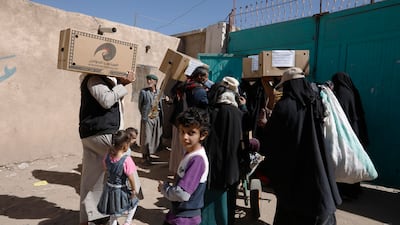The UN is a body designed to accomplish the difficult task of promoting diplomacy over conflict, with the ultimate aim of maintaining global peace. For eight years, it has failed to do so in Yemen. This is not for want of trying. There have been multiple representatives to the country and many attempts at dialogue.
Next week, the issue will once again be up for discussion. And in recent days, there have even been some tentative signs of an improvement on specific issues to do with the conflict. But after so many terrible years, it is important to define what "progress" might resemble, and how likely it actually is, even in spite of the odd good sign.
Indeed, as the UN prepares for new talks to find a political settlement to the conflict, its special envoy to Yemen, Hans Grundberg, is trying to manage expectations. "Trust is low and ending this war will require uncomfortable compromises," he says, encouraging "every possible effort to impress upon parties that there is no sustainable military solution". One of the UN's limitations has been to equate all sides of the conflict, when in reality there is an internationally recognised government on the one hand, a terrorist group that seized power by force on the other, as well as yet more parties trying to fill the vacuum due to that seizure.
Without pressure to negotiate in good faith, the Houthis have previously used talks as a stalling tactic. Their recent attacks on the UAE, Saudi Arabia, and on areas within Yemen have made their intentions clear.

In anticipation of an underwhelming result, the UAE's envoy to the UN, Lana Nusseibeh, is holding groups involved in discussions to account, criticising on Tuesday some efforts as an “appeasement” of Houthi rebels. Ms Nusseibeh called for tougher measures, including sanctions, against the group.
“Stopping the Houthis' aggressive behaviour requires the international community to take serious, decisive and tangible steps, all of which keep in mind the nature of the Houthis' extremist ideology and their true intentions,” she said.
It is with this clear-eyed attitude that isolated, but nonetheless important, recent developments should be viewed. The most immediate crisis that could be on track to a resolution is FSO Safer, an abandoned oil tanker drifting off the coast of Yemen that could quite literally explode at any moment. Now, UN humanitarian chief Martin Griffiths has revealed that an agreement has been reached "in principle" to transfer more than one million barrels on to another ship.
Even the slightest progress on the matter is important. An explosion would spell disaster for the Red Sea's marine life, desalination plants and shipping lanes. Greenpeace has said it has the potential to cause one of the biggest oil spills in history. Despite this huge risk, the Houthis have for years been happy to use it as a bargaining chip. For them to give way, however tentatively, can only be welcome.
It is also a sign that their positions are not necessarily intransigent, despite appearances. Parties countering the Houthis can continue to find room for movement through collective resolve. The Houthis' tenuous situation will not be helped by news that the Yemeni army has retaken areas south of the strategic Marib province in central Yemen.
If this next cycle of activity at the UN is to be different from previous ones, harnessing positions of strength, not appeasement, should be the way forward. The past few years have provided enough evidence that the Houthis are not interested in a rules-based international order. For those working on bringing Yemen back into that fold, stronger approaches of the kind being advocated by the UAE and its regional allies will be needed.


